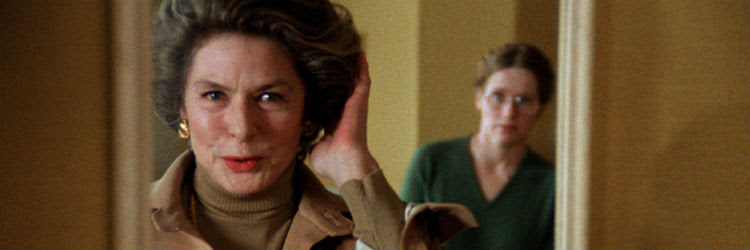Autumn Sonata
I went last night, as I often do on a Tuesday, to a gathering that is rapidly gaining a reputation as a North London institution – the Tufnell Park Film Club. We sit in the upstairs room of the Lord Palmerston and watch a film, selected with the help of our two viddymasters, Nigel and Wayne.
Last night’s film was Autumn Sonata, Ingrid Bergman’s last film, directed by her namesake Ingmar. On the way there my friend Mark wondered just how bleak the film was going to be. I had seen it some time ago, so risked an answer – wrongly so. Seduced by the title, and the colouring of the poster, I said I thought it was one of Bergman’s more mellow films, but it turned out to be an intense exploration of anguished mother-daughter relations, with Ingrid B (Charlotte) and Liv Ulman (Eva) laying bare their feelings in no uncertain terms, in the beautiful but austere surroundings of a Norwegian vicarage. If we needed our guts twisted any further, there’s Eva’s crippled sister writhing on the floor upstairs as her mother and sister go at each other below.

It’s not comfortable viewing, and there’s no cleansing resolution at the end. I’m not sure how much I’ll be talking about it with my daughters. But what’s the relevance to the Paula Principle? Charlotte is a renowned concert pianist, constantly travelling to give concerts. Her music, it’s clear, took precedence over her children. There’s a heart-rending flashback to little Eva at home waiting desperately outside the study door for a break in her mother’s hours-long rehearsing and taking in her coffee, only to be summarily sent out to play as mama wishes to be alone. Charlotte is a very, very good player. But it seems that she peaked at age 20, with a triumphal performance of Beethoven’s first sonata at a level she was never to attain again – at least according to the elderly male conductor with whom she regularly dines after her performances. And – here’s the pinch – even she, dedicated as she is to her music, and egotist as she is, cannot but be aware that as she tours the concert halls her children are missing her at home. Their pathetic father can only sit in silence with Eva, and sister Helena’s illness tragically gathers momentum.
We are left to decide for ourselves whether it was that awareness that prevented her from continuing to attain the heights. Or maybe it was just that the bar was always set higher for a female performer in a male world.
